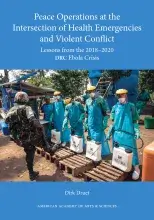Peace Operations at the Intersection of Health Emergencies and Violent Conflict: Lessons from the 2018–2020 DRC Ebola Crisis
The unstable province of North Kivu, in the eastern DRC, has hosted an insurgency for almost three decades despite the presence of peacekeepers from the UN peacekeeping mission known as MONUSCO. When Ebola began to spread in an area of active conflict and the World Health Organization (WHO) initiated a large-scale emergency health response program in 2018, the effects on conflict dynamics were immediate, profound, and ultimately undermined both health and peace-building efforts in the DRC.
As part of the Academy’s project on Rethinking the Humanitarian Health Response to Violent Conflict, this research paper asks how the health response impacted the conflict, what roles peacekeepers played in the response, and what can be learned about security, perceptions, and trust in international responses to multidimensional emergencies in conflict environments. As the COVID-19 pandemic brings together conflict dynamics and health emergencies in a wide variety of settings, and as trends in the politicization of humanitarian assistance continue, the study provides insights into how the international community can better manage future multidimensional emergencies.
Access the Policy Brief highlighting recommendations and policy implications
